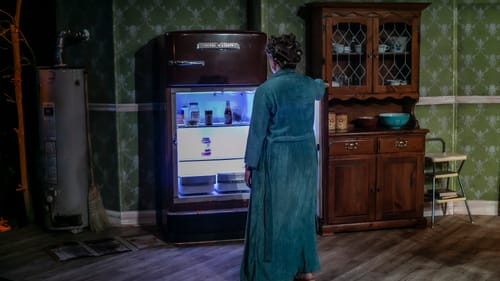Stay in the Loop
BSR publishes on a weekly schedule, with an email newsletter every Wednesday and Thursday morning. There’s no paywall, and subscribing is always free.
Still a giant of the genre
EgoPo Classic Theater presents Sam Shepard’s Curse of the Starving Class

Lambs are led to slaughter in Curse of the Starving Class, now on stage in a production from EgoPo Classic Theater. Humans don’t fare much better in Sam Shepard’s dark comedy of downward mobility in 1970s Southern California.
Take Weston Tate (Rob Kahn), for example, who drowns himself so deep in drink that he finds himself swindled out of the family farm, all while fancying himself a keen surveyor. Or his wistful wife Ella (Melanie Julian), who dreams of a glamorous escape to Europe that flies in the face of her harsh reality. Their children Wesley (Dawn McCall) and Emma (Kylie Westerbeck) seem headed toward a similarly bleak future—those diminutive names are no accident coming from a playwright as symbolically driven as Shepard.
And then there’s the spring lamb that keeps finding its way into the kitchen of the Tate homestead. It may look adorable on the outside—the audience on opening night dutifully swooned at the woolly creature, supplied by the Little Hooves Romney farm in Moorestown, New Jersey—but it’s rotting from the core with maggots. Another metaphor.
“Kind of raggedy”
Curse helped Shepard break into the mainstream when it premiered in 1978, but it appears less frequently now than other plays he wrote in the same period, like True West or Buried Child. These works tend to investigate the same themes, including the sinister creep of suburban sprawl and the disintegration of the nuclear family, but Curse approaches the subject in a slightly unwieldy manner, incorporating elements of farce and surrealism into the classic kitchen-sink drama. In an interview with the New York Times, Shepard described the play as “kind of raggedy.”
He wasn’t wrong. It takes vision and effort to corral the tonal and stylistic shifts embedded in the characteristically poetic text. Director Lane Savadove does an admirable job balancing the sly humor and self-conscious weirdness of the first and second acts—a refrigerator filled with nothing but artichokes, a 4H poster dramatically showered with urine—and the devastating denouement that leaves the family irrevocably broken. (The play is staged here with only one intermission, between acts two and three.) The balances between naturalism and absurdism occasionally seem off, particularly with regard to the series of goonish characters who haunt the Tate family from the periphery: a predatory lawyer (Damien J. Wallace) who wants their house for himself; an enabling saloon owner (Scott Rodrigue) who only cares about his cash.

Rich atmospherics
Overall, though, the key elements of Shepard’s complicated play come through with clarity and wit, thanks largely to the richly atmospheric physical production. Scenic designer Dirk Durossette creates a country kitchen in physical and existential disrepair—you hardly bat an eye when someone climbs atop a pile of clothes on the table for a nap. Andrew Cowles’s lighting skillfully limns the harshness of reality and the soft-grained glow of the characters’ hopeless dreams. Music choices perfectly evoke the era—Neil Young’s “Old Man” is an inspired selection for a play about the inevitability of generational succession—but someone should tell sound designer Ava Weintzweig that when you turn on a radio, it doesn’t always start at the beginning of a song.
The performances largely draw out the pungent flavor of the script, although Kahn’s Weston is little more than blustery and belligerent. Julian fares better, her faux gentility barely masking a bone-deep crassness. McCall makes for a dreamy, doomed Wesley, and Westerbeck captures Emma’s firebrand nature, although her violent return in the last act is a little muted. Savadove has long had a knack for introducing interesting young actors; Taye Hopkins and Jackson Brown, both students at Rowan University, turn two small roles as scary strongmen into juicy cameos.
Worth the wait
Originally scheduled for performances in March 2020, Curse marks the official end to EgoPo’s survey of Shepard, who died in 2017. This production unintentionally takes on a new significance after its two-year delay, with more and more people experiencing the same reality as the Tates: simultaneously trapped and rootless. Evolving relevance is the mark of a great writer, and EgoPo makes the case here for Shepard as a giant of the genre.
What, When, Where
Curse of the Starving Class. By Sam Shepard, directed by Lane Savadove. $12-$36. Through June 26, 2022, at the URBN Center Annex Black Box Theater at Drexel University, 3401 Filbert Street, Philadelphia. (267) 273-1414 or egopo.org.
Proof of Covid-19 vaccination is required to attend, and masks must be worn inside the theater.
Accessibility
The URBN Center Annex is an ADA-compliant venue. For information about accessible seating, email [email protected].
Sign up for our newsletter
All of the week's new articles, all in one place. Sign up for the free weekly BSR newsletters, and don't miss a conversation.

 Cameron Kelsall
Cameron Kelsall